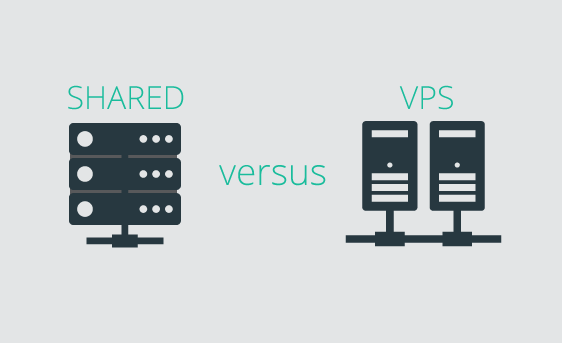Shared Hosting versus VPS
A Quick Reference

If you’re new to the world of web hosting, you may not be aware of the multitude of hosting options available to house your website, including an online store or blog. Depending on your needs, there are solutions for any budget. Two of popular cost-effective options are shared web hosting and Virtual Private Server, more commonly referred to as VPS Hosting. There are key differences to consider before deciding which hosting direction to take.
Shared Overview
The “share” in shared web hosting refers to the sharing of physical components and software capabilities within a web server. On a shared server your website’s directories and files would be located on hard drive amongst hundreds of other websites. Your site then shares space on that hard drive with many other individuals or businesses. The web server’s CPU (Central Processing Unit) and RAM (Random Access Memory) is also shared amongst other websites, that process web page requests and scripts processing, such as with a form validation and submission. By dividing up physical and software resources on a single webserver a web host like HostMySite can then offer this as the cheapest hosting option. In this sense, you share the cost of utilizing a web server with other individuals and that keeps costs way down.
Typically, shared web hosting is fine for a majority of people and even small businesses or organizations that have a simple website. Shared hosting customers do not have to be concerned with the potential headache of managing a web server. There is the rare but potential consideration that another website located on the same server as you may cause performance problems for everyone else on the server. This can occur if a website suddenly receives exceptionally huge amounts of visits or traffic, or if some website code processing begins to monopolize significant amounts of disc space, the CPU, or RAM access or a combination thereof. It’s rare but does happen on occasion. HostMySite’s web servers are constantly monitored to alert our server administrators of these issues, so on the rare occasion that it may occur, it is typically maintained quickly.
Shared Web Hosting Advantages
- Typically the least inexpensive hosting
- Well suited for majority of people who want a simple website without the headaches of managing a server.
Shared Web Hosting Disadvantages:
- Another website, other your own, can cause performance problems on the server, which in turn affects yours
- You are not able to add additional physical resources nor access the web server’s administration system
Certain applications cannot be run in a shared environment
If you are concerned with any of these disadvantages, it is possible that a VPS would be a better option.
VPS Hosting Overiew
A Virtual Private Server, or more-commonly referred to a VPS, is almost like having your own entire web server, but at the fraction of the cost. The key word is “virtual,” where you are provided with a virtualized instance of an entire web server that is actually configured within larger physical server. With VPS, you control and utilize resources that are completely independent of anyone else who may have a VPS on the physical server. While in shared all physical and software resources are divided, VPS instances are sections off so it’s like having your very own hard drive, CPU and RAM. On your VPS you can install programs, applications, and databases.
VPS is suited to larger businesses whose website or online application receives significant amounts of traffic or perform a lot of code processing such as with a busy online ecommerce store or database. VPS does require an advanced level of knowledge for server administration and would typically be managed by a website developer, application developer, or server administrator. Resellers of web hosting or agencies who manage numerous websites are encouraged to host on a VPS for performance benefits, centralizing website locations, and advanced web server controls. As businesses grow, VPS resources can easily be expanded without having to migrate websites or applications to larger servers.
VPS Advantages:
- You are not affected if another website on the server is causing problems.
- You are able to add additional resources and applications when your business grows
Disadvantages:
- VPS is a more advanced solution and is self-managed, unlike shared hosting.
- Having a VPS may mean adding the cost of a server administrator to help you.
No matter what solution you may decide on, HostMySite offers both Shared Hosting and VPS Hosting options to fit your need and budget. Watch for hosting discounts with those offerings and HostMySite always provides 24×7 Online Support.